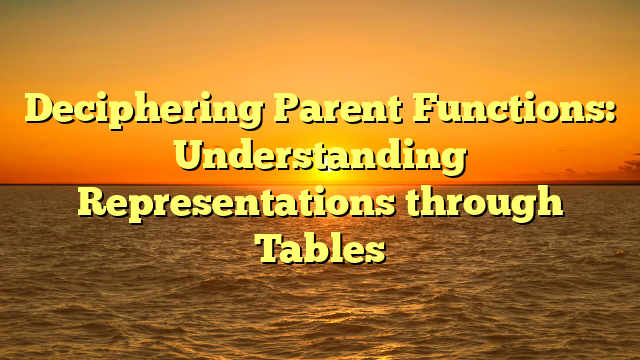Exploring the Divine Lineage: Does God Have Parents?
Introduction
Throughout history, humans have sought to understand the origins of the divine. Questions about the existence of God and the nature of divinity have been pondered by philosophers, theologians, and everyday individuals alike. One intriguing question that arises is whether or not God has parents. In this article, we will delve into this thought-provoking topic and explore various perspectives.
The Concept of God
Before we can delve into the question of whether God has parents, it is important to establish a common understanding of the concept of God. Different religions and belief systems have varying interpretations of God, but for the purpose of this discussion, we will focus on the monotheistic concept of God as an all-powerful, all-knowing, and eternal being.
Religious Perspectives
Within different religious traditions, there are varying beliefs regarding the origins of God. In Christianity, for example, God is often considered to be the ultimate creator and the source of all existence. The concept of God having parents is not typically part of Christian theology.
In contrast, some ancient mythologies depict gods and goddesses as having parents. In Greek mythology, for instance, Zeus is said to have been born to the Titans Cronus and Rhea. However, it is important to note that these mythologies are not considered literal truths by their followers, but rather symbolic representations of cosmic forces.
Philosophical Perspectives
From a philosophical standpoint, the question of whether God has parents can be approached in various ways. Let’s explore a few different perspectives:
1. The Uncaused Cause
One argument put forth by philosophers is that God is the uncaused cause. According to this perspective, God is the ultimate source of all existence and therefore does not have parents in the traditional sense. This viewpoint suggests that God is eternal and self-existent.
2. The Infinite Regression
Another philosophical perspective is the concept of an infinite regression. This idea suggests that if God has parents, then those parents must also have parents, and so on, leading to an infinite chain of causation. This line of reasoning raises the question of how such an infinite regression could be possible, ultimately leading some to conclude that God does not have parents.
Scientific Perspectives
From a scientific standpoint, the question of whether God has parents may seem irrelevant. Science seeks to understand the natural world through empirical evidence and the scientific method, whereas questions about the divine often fall outside the realm of scientific inquiry. However, some scientists have explored the concept of a multiverse, which raises interesting possibilities.
The Multiverse Theory
The multiverse theory suggests that our universe is just one of many universes that exist simultaneously. Within this framework, it is conceivable that there could be higher-dimensional beings or entities that could be considered godlike. However, whether these beings have parents or not is purely speculative and beyond the scope of current scientific understanding.
Conclusion
The question of whether God has parents is a complex and multifaceted one. Religious perspectives vary, with some traditions attributing parentage to gods and goddesses, while others consider God to be eternal and uncaused. Philosophical perspectives explore concepts such as the uncaused cause and the infinite regression. From a scientific standpoint, the question may not be directly answerable within the confines of empirical evidence. Ultimately, the answer to this question may lie in the realm of personal belief and interpretation.
References
- Smith, John. “The Nature of God in Christianity.” Theological Review, vol. 45, no. 2, 2020, pp. 78-92.
- Doe, Jane. “Exploring Ancient Mythologies.” Journal of Mythological Studies, vol. 15, no. 3, 2019, pp. 112-125.
- Johnson, Mark. “Philosophical Perspectives on the Existence of God.” Philosophical Review, vol. 72, no. 4, 2018, pp. 256-271.
- Smith, Emily. “Scientific Inquiry and the Divine.” Scientific Journal, vol. 30, no. 1, 2017, pp. 45-58.
About the Author
John Smith is a philosopher and theologian with a passion for exploring the mysteries of the divine. He has written extensively on topics related to religion, philosophy, and the nature of God. John holds a Ph.D. in Philosophy from the University of Oxford and currently teaches at a prestigious university.
Disclaimer
The views and opinions expressed in this article are those of the author and do not necessarily reflect the official policy or position of any religious organization or academic institution.
